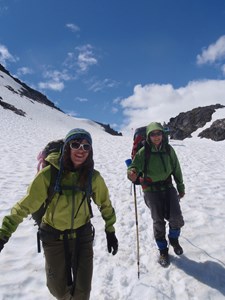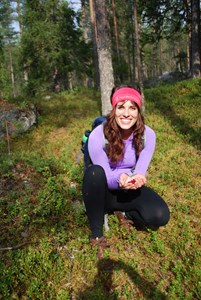With significant environmental change occurring globally, it is no secret that circumpolar environments will be put at an elevated risk, so when it came time to choose a regional specialization for my degree, choosing to study Arctic and Antarctic environments was a decision that came easily. To cover the Arctic portion of my degree, I am currently completing the Arctic Studies Program at the University of Lapland in Rovaniemi, Finland, a program which I am loving every minute of!
Growing up in the Yukon, I have been surrounded by wildlife and natural resource protection since I can remember. My father’s career as a Conservation Officer provided me an array of unique experiences with northern wildlife growing up; I spent parts of my youth looking after the latest temporary adoptee to the family, whether that meant caring for mother-less signets, feeding an injured bald eagle or washing a mallard duck from an oil spill. At one point, we even had an orphaned moose calf running around our yard! My parents engrained in me from a very young age the importance of wildlife and the need to protect them and their resources. Life has always included cranberry picking in the fall, ice fishing in the winter and lots of hiking and canoeing in spring and summer, and as I grew older, it became clear just how important natural, wild areas are to me, society and the wildlife that permanently inhabit them. Although I grew up with knowledge of northern environmental awareness around me, it was within the last few years that I clearly realized this is the cause I wish to devote my professional life to.

Work and travel experiences led me to study northern environments; two seasons working for the Yukon Fish and Game Association at a fish ladder piqued my interest in northern environmental issues as I witnessed the decrease in wild salmon populations and learned about the causes and effects of their population decline. Following this, I took a position in the House of Commons as a Page while studying full-time at the University of Ottawa. Serving in Parliament gave me an inside look at the legislative process and provided insight into effective ways to influence social change. In Ottawa I realized that combining my passion for politics and love for the outdoors could be possible as an environmental lawyer, and that this career could be extremely useful in the circumpolar world. Working towards expanding and protecting natural areas and standing up to individuals and corporations that unlawfully harm Arctic and Antarctic wildlife are the types of issues I hope to someday work on. Last spring, I self-funded a trip to Iceland to participate in a study camp focusing on water, nature and sustainable energy. While there, I explored Iceland’s green energy and also visited the controversial aluminum smelter recently constructed in East Iceland, hearing views from both environmentalists and industry representatives. Environmental damage included the flooding of reservoirs and the displacement of wildlife within the region. Using hydropower to operate the smelter however, dramatically reduced carbon dioxide emissions, while meeting the need for aluminum in the global market. I was inspired to someday work on cases such as this to legally ensure that infrastructure is designed in an efficient, sustainable way that does not harm biodiversity and cause habitat degradation in naturally rich and wild areas of the planet.
To begin my study of Arctic environments, I stayed in Whitehorse and studied by distance through UBC last fall semester while taking a northern wildlife course at Yukon College. To cover the Antarctic portion of my program, I arranged to study for a year at the Gateway Antarctica Faculty at Canterbury University in New Zealand. Unfortunately, the impact of the 6.3 magnitude earthquake on my second day of class there slightly disrupted my study plan, but I was still able to finish my course. The professors at the Gateway Antarctica faculty hail from a variety of disciplines and were very inspiring educators! Throughout the semester, I learned everything from the geological formation of the southernmost continent, to Antarctic weather patterns to sea ice classifications, to the history of Antarctic exploration. Prior to my study term there, I completed an internship with the Council of Managers of National Antarctic Programs in Christchurch. Working for Executive Secretary Michelle Rogan-Finnemore, a lawyer specialized in Antarctic Treaty Law, was the best work experience I have ever had! This placement opened my eyes to the complexity of international relations in circumpolar regions, and working with Michelle re-affirmed my desire to someday study Polar Law.

Following this experience, I was keen to learn more about Arctic issues to compare and contrast the two poles! As the poles are so interconnected, especially in terms of science activities, I see it to be extremely important for Arctic students to have some understanding of the other polar end of our planet, and believe this will only lead to continued cooperation and greater, more unified scientific advancements and impacts, as IPY has demonstrated.
My course coordinator at the University of British Columbia informed me of a student, Ashley Tufts, in my program, who completed the Arctic Studies Program here in Lapland a few years back, and had really enjoyed it. After contacting Ashley and hearing her enthusiasm about the program here, I realized the Arctic Studies Program was a must. I am so happy to find myself here in Rovaniemi now. It is the most comforting feeling to be back studying north of 60. Last weekend, I went out berry picking, just like at home! How many university locations in the world can offer that comfort of home!? I am looking forward to the rest of the semester, and to learning more about life in another northern country. As Arctic residents, we live in such a unique region of the world compared to the vast majority of people. I believe there is so much that Arctic countries can learn from each other when it comes to common challenges we face. I look forward to developing a more extensive, comprehensive view of the Arctic here in Northern Finland.
Published in 2011.
